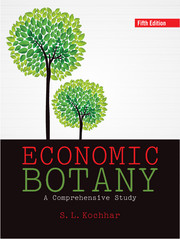Book contents
- Frontmatter
- Dedication
- Contents
- Foreword
- Preface
- Acknowledgements
- 1 Introduction
- 2 Fibres and Fibre Yielding Plants
- 3 Cereal Crops
- 4 Sugars, Starches and Cellulose Products
- 5 Legumes or Pulses
- 6 Vegetable Oils and Fats
- 7 Fruits and Nuts
- 8 Vegetables
- 9 Spices, Condiments and Other Flavourings
- 10 Fumitory and Masticatory Materials
- 11 Beverages
- 12 Wood and its Uses
- 13 Vegetable Tannins and Dyestuffs
- 14 Rubber
- 15 Medicinal Plants
- 16 Insecticides and Herbicides
- 17 Essential Oil Yielding Plants
- 18 Plant Diversity and its Conservation
- 19 Petrocrops: Our Future Fuels
- 20 Ethnobotany: An Integrated Approach
- References
- Index
Foreword
Published online by Cambridge University Press: 08 February 2018
- Frontmatter
- Dedication
- Contents
- Foreword
- Preface
- Acknowledgements
- 1 Introduction
- 2 Fibres and Fibre Yielding Plants
- 3 Cereal Crops
- 4 Sugars, Starches and Cellulose Products
- 5 Legumes or Pulses
- 6 Vegetable Oils and Fats
- 7 Fruits and Nuts
- 8 Vegetables
- 9 Spices, Condiments and Other Flavourings
- 10 Fumitory and Masticatory Materials
- 11 Beverages
- 12 Wood and its Uses
- 13 Vegetable Tannins and Dyestuffs
- 14 Rubber
- 15 Medicinal Plants
- 16 Insecticides and Herbicides
- 17 Essential Oil Yielding Plants
- 18 Plant Diversity and its Conservation
- 19 Petrocrops: Our Future Fuels
- 20 Ethnobotany: An Integrated Approach
- References
- Index
Summary
Professor S. L. Kochhar is one of the most distinguished authorities in the field of economic botany in the world. He has not only been a great teacher but also an eminent author of many books in the area of botany. The present book is the 5th edition of his earlier book “Economic Botany in the Tropics” which was first published in 1981. During the last 35 years he has published several other books introducing both students and the public to the beauty and utility of many of our flowering plants.
The present book deals, in a comprehensive way, with a variety of crops including cereals, grain legumes, fruits, vegetables, oil seeds and root and tuber crops. It also deals with many interesting issues like the origin of maize and the health risks associated with tobacco. In particular, the author has dealt in an authoritative manner with issues relating to transgenic crops. As far as I know, there is no other book which covers with such great scientific authority and clarity the range of topics dealt with by Professor Kochhar. This is a gift, in particular, to the student of botany as well as to all interested in economic botany.
Professor Kochhar's dedication to the science of economic botany and to spreading a love of plants is practically unmatched. This, latest, book is the outcome of his dedication to the cause of spreading scientific literacy in the area of economic botany. I hope the book will be widely read and used not only by university students and teachers but by all interested in the world of botany. We should always recall that we live on this planet as guests of green plants, sunlight and farmers. This book as well as the earlier books of Professor Kochhar will help to strengthen our bonds with nature.
- Type
- Chapter
- Information
- Economic BotanyA Comprehensive Study, pp. xv - xviPublisher: Cambridge University PressPrint publication year: 2016



